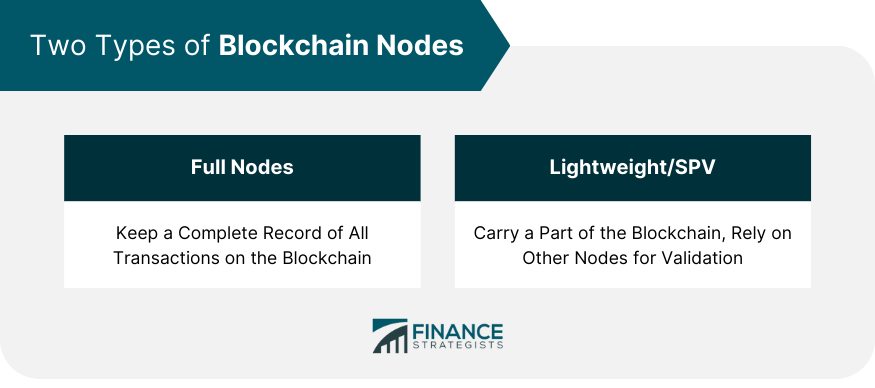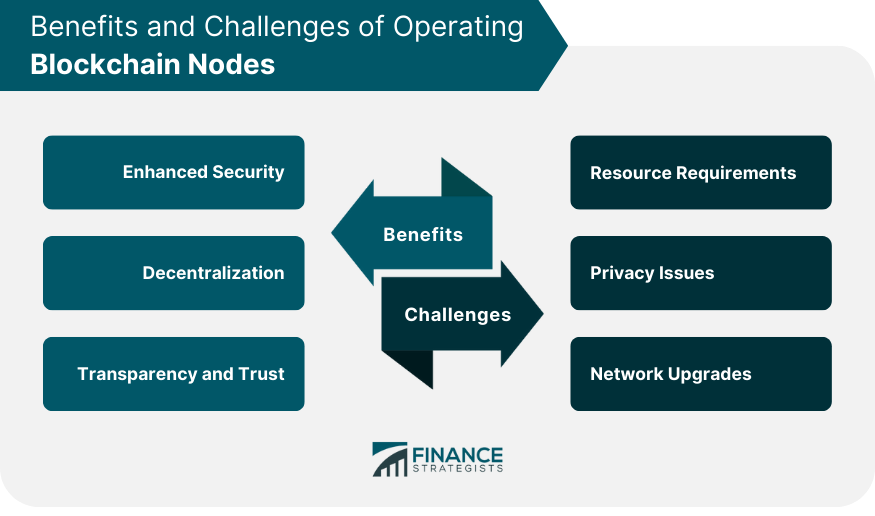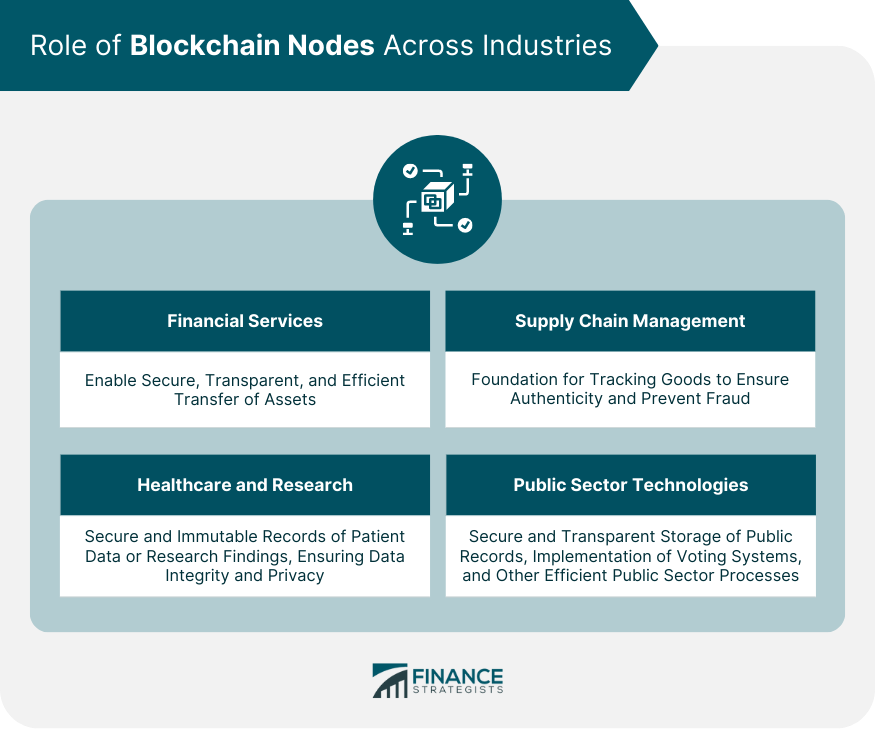A blockchain node is a fundamental unit of the blockchain infrastructure. Serving as a connection point, it contains and shares data across the blockchain network. Every blockchain node carries a copy of the blockchain, either in whole or in part. This enables the decentralization that defines the blockchain. These nodes don't merely exist for data storage purposes. They actively contribute to the blockchain's workings by verifying and passing on transactions. It is through the interconnected web of nodes that blockchain attains its unique level of trust and security, where no central authority exists to oversee the operations. Additionally, by continuously updating and synchronizing the blockchain across all nodes, it ensures that every transaction remains transparent and immutable, reinforcing the fundamental ethos of blockchain technology. In the blockchain universe, two primary types of nodes exist: full nodes and Simple Payment Verification (SPV) or lightweight nodes. Full nodes, true to their name, keep a complete record of all transactions made on the blockchain. This enables them to independently validate any transaction without requiring validation from other nodes. Contrastingly, SPV nodes only carry a part of the blockchain, needing to rely on other nodes for transaction validation. Lightweight nodes are designed for systems that cannot spare large computational power or storage space, thus providing a more accessible entryway into the blockchain ecosystem. Blockchain nodes don't exist in isolation; they continually communicate with each other using a peer-to-peer protocol. This communication ensures that all nodes in the network remain updated about the most recent transactions and blocks, allowing the network to remain consistent and resilient. Nodes play a crucial role every time a transaction occurs on the blockchain. They follow the predefined rules of the network's protocol, scrutinizing each transaction for the correct structure, proper inputs and outputs, and the necessary transaction fees. Achieving consensus is paramount in a blockchain network, and nodes are integral to this process. In blockchain systems that utilize proof-of-work (PoW) or proof-of-stake (PoS) consensus mechanisms, nodes are involved in determining the valid version of the transaction history. Operating blockchain nodes significantly enhances the overall security of the network. With every node verifying transactions, it becomes extraordinarily challenging to carry out fraudulent activities on the network. The operation of blockchain nodes embodies the decentralization principle that is at the heart of blockchain technology. With every node maintaining a copy of the blockchain, the network remains robust and secure, even if some nodes were to fail or behave maliciously. Nodes play a significant role in fostering transparency and trust within the blockchain network. As they validate and propagate transactions, they create an immutable and public record that anyone on the network can access and scrutinize. The operation of a full node on a blockchain network can be resource-intensive. The requirement for storage space, computational power, and internet bandwidth can be extensive, especially for more mature blockchains with a large transaction history, such as Bitcoin. While the transparency of blockchain networks is often touted as a positive, it can also lead to potential privacy issues. Advanced analysis of the flow of transactions might, theoretically, allow the identification of the participants involved in a transaction. Whenever the blockchain protocol undergoes an update or change, nodes must be upgraded, which can be a complex and intricate process. The situation becomes even more complex in the event of a hard fork, where nodes must decide which version of the software to run, effectively determining the blockchain's future course. Blockchain nodes have a significant impact on the financial services industry. Banks, insurance companies, and fintech startups leverage blockchain technology to enable the secure, transparent, and efficient transfer of assets facilitated by the nodes' functioning. In supply chain management, blockchain nodes serve as a foundation for the tracking of goods as they move from the manufacturer to the consumer. This tracking ensures the authenticity of the goods and helps prevent fraudulent practices. The healthcare and research sectors also harness the power of blockchain nodes. Nodes can provide a secure and immutable record of patient data or research findings, ensuring data integrity and privacy, crucial aspects in these fields. Public sector entities are beginning to realize the potential of blockchain nodes. Blockchain technology can offer secure, transparent, and efficient methods for storing and accessing public records, implementing voting systems, and more. Operators of blockchain nodes must ensure compliance with local laws and regulations. These can vary greatly from one jurisdiction to another and can cover areas such as data protection, consumer protection, and financial services regulations. Beyond local laws, international regulations can also impact node operators. These could pertain to cross-border data transfers, international financial transactions, or global standards for preventing financial crimes. Operators of blockchain nodes should have a clear understanding of the legal risks involved. For example, a node operator could potentially be held responsible for validating illegal transactions or inadvertently facilitating financial crime. Scalability presents a significant challenge for blockchain networks. As the volume of transactions increases, each node needs to process and store more data. This growth can lead to performance issues and slow down the network. Several solutions are being explored to address scalability issues. For instance, sharding, which breaks the blockchain into smaller, more manageable pieces, and layer-2 solutions, which process transactions off the main blockchain, offer promising improvements. The field of blockchain technology continues to evolve, with new solutions being developed to overcome scalability challenges. The advent of advanced technologies, such as quantum computing, could revolutionize the way blockchain nodes function and handle larger volumes of data. Blockchain nodes—both full and lightweight—serve as pillars for the decentralization, trust, and security synonymous with blockchain technology. They facilitate transaction verification, enhance network security, and promote transparency. Operating in various industries, from financial services to healthcare, they enable efficient asset transfers, authenticity tracking, fraud prevention, and secure record-keeping. However, challenges related to resource requirements, privacy issues, network upgrades, and scalability persist, posing a hurdle to the seamless operation of nodes. Additionally, operators must navigate intricate local and international regulations to ensure compliance and mitigate legal risks. With the fast-paced evolution of technology, prospective solutions such as quantum computing and sharding offer hope for overcoming scalability issues and enhancing the functionality of nodes. But, the multifaceted world of blockchain necessitates professional guidance to harness its full potential. For individuals and organizations aiming to leverage blockchain's transformative power, seeking expert wealth management services can provide the necessary support and insight. What Is a Blockchain Node?
Inner Workings of Blockchain Nodes
Two Types of Nodes: Full Nodes and Lightweight or SPV Nodes

Communication Protocol Within the Network
Transaction Verification and Block Validation
Vital Role of Nodes in Consensus Mechanisms
Benefits of Operating Blockchain Nodes
Enhancing the Network's Security
Promoting the Principle of Decentralization
Facilitating Transparency and Trust
Challenges of Operating Blockchain Nodes
Resource Requirements and Challenges
Privacy Issues
Network Upgrades and Their Challenges

Role of Blockchain Nodes Across Industries
Financial Services
Supply Chain Management
Healthcare and Research
Public Sector Technologies

Legal and Regulatory Considerations When Operating Blockchain Nodes
Compliance With Local Laws and Regulations
Navigating International Regulations
Understanding and Managing Legal Risks
Scaling Blockchain Nodes
Understanding the Challenges With Scalability
Innovations for Scaling Blockchain Nodes
Looking Forward: Potential Solutions for Scalability Issues
Final Thoughts
Blockchain Nodes FAQs
Blockchain nodes are essential units of the infrastructure that validate transactions, maintain security, and promote transparency.
Full nodes keep a complete record of transactions, while lightweight nodes carry a part of the blockchain and rely on other nodes for validation.
Blockchain nodes play a vital role in determining the valid transaction history in consensus mechanisms like proof-of-work or proof-of-stake.
Operating blockchain nodes can require significant resources, raise privacy concerns, and pose complexities during network upgrades.
Blockchain nodes find applications in finance, supply chain management, healthcare, and public sectors, providing secure and transparent solutions.
True Tamplin is a published author, public speaker, CEO of UpDigital, and founder of Finance Strategists.
True is a Certified Educator in Personal Finance (CEPF®), author of The Handy Financial Ratios Guide, a member of the Society for Advancing Business Editing and Writing, contributes to his financial education site, Finance Strategists, and has spoken to various financial communities such as the CFA Institute, as well as university students like his Alma mater, Biola University, where he received a bachelor of science in business and data analytics.
To learn more about True, visit his personal website or view his author profiles on Amazon, Nasdaq and Forbes.











